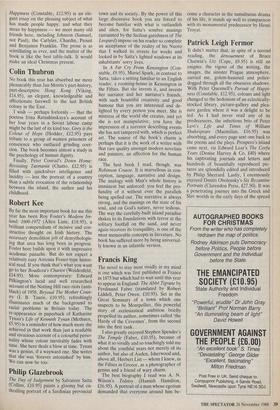Philip Glazebrook
The Day of Judgement by Salvatore Satta (Collins, £10.95) paints a gloomy but en- thralling portrait of a Sardinian provincial town and its society. By the power of this large discursive book you are forced to become familiar with what is outlandish and alien, for Satta's sombre musings (untainted by the Sicilian garishness of The Leopard) impose on his reader so complete an acceptance of the reality of his Nuoro that I walked its streets for weeks and looked in by Satta's lighted windows at its inhabitants' sorry lives.
In A Far Cry From Kensington (Con- stable, £9.95), Muriel Spark, in contrast to Satta, takes a setting familiar to an English reader, a rooming-house in Kensington in the Fifties. But she invests it, and invests her narrator and her narrator's friends, with such bountiful creativity and good humour that you are interested and de- lighted by every person you meet. She is mistress of the world she creates, and yet she is not manipulative; you have the impression of a narrator describing events she has not tampered with, which is perfect art. The source of the book's charm is perhaps that it is the work of a writer with that rare quality amongst modern novelists and painters, an affection for the human race.
The best book I read, though, was Robinson Crusoe. It is marvellous 'in con- ception, language, narrative and design. The analogy with Man's whole history is imminent but unforced: you feel the pro- fundity of it without ever the parallels being spelled out. The narrative is always strong, and the musings on the state of his soul, and on God's nature, never tedious. The way the carefully-built island paradise shakes to its foundations with terror at the solitary footfall on the sand, and never again recovers its tranquillity, is one of the most memorable concepts in literature. No book has suffered more by being universal- ly known in an infantile version.










































































 Previous page
Previous page